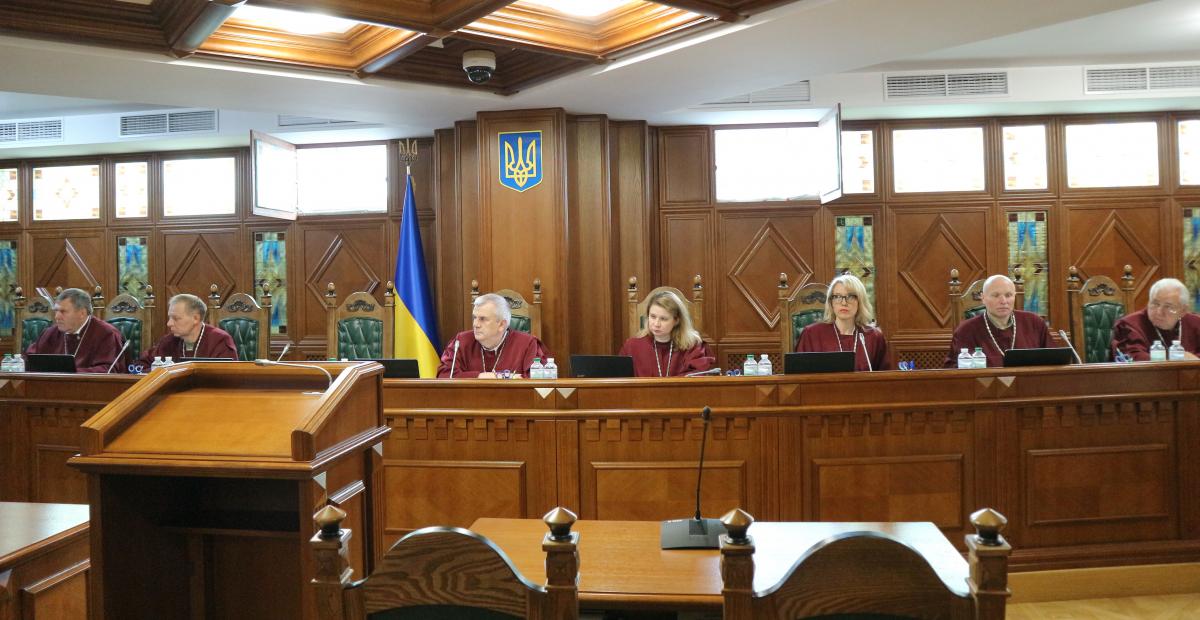July 3, 2024
On July 3, 2024, the First Senate deliberated the case upon the constitutional complaint of Olena Linkevych in the public part of the plenary session in the form of written proceedings.
According to Oksana Hryshchuk, the judge-rapporteur in the case, the applicant appealed to the Constitutional Court of Ukraine to verify the constitutionality of paragraph 3 of Section II “Final and Transitional Provisions” of the Law of Ukraine “On Amendments to Certain Legislative Acts of Ukraine” No. 1774-VIII dated December 6, 2016 (hereinafter, “Law No. 1774”).
The disputed provisions of Law No. 1774 stipulate that “the minimum wage after the entry into force of this Law shall not be applied as an estimated value for establishing the salaries and wages of employees and other payments, except for the calculation of the annual amount of funding for the statutory activities of political parties. Until amendments are introduced to the laws of Ukraine regarding the non-application of the minimum wage as an estimated value, it shall be applied in the amount of the subsistence minimum for able-bodied persons established as of 1 January of the calendar year, starting from 1 January 2017.”
From the content of the constitutional complaint and the case files attached to it, it follows that Olena Linkevych is a pensioner who does not work, is registered with the Main Department of the Pension Fund of Ukraine in Zhytomyr Oblast (hereinafter, the “Department”), has the status of a person affected by the Chornobyl disaster, and lives in a settlement classified as a zone of radioactive contamination as a result of the Chornobyl disaster.
The complainant notes that Law No. 1774 “changed the estimated value from the minimum wage to the subsistence minimum, which was previously applied to calculate all payments where the minimum wage was used as the estimated value, as well as to calculate other payments and sanctions, and introduced such amendments to a number of laws of Ukraine”.
She also notes that with the adoption of paragraph 3 of Section II “Final and Transitional Provisions” of Law No. 1774, there was an actual reduction in the amount of the pension supplement as a pensioner who does not work and resides in the territory of radioactive contamination, compared to the previously established payments under Article 39 of the Law of Ukraine “On the Status and Social Protection of Citizens Affected by the Chornobyl Disaster” dated February 28, 1991 No. 796-XII (hereinafter, “Law No. 796”).
Therefore, Olena Linkevych filed an administrative lawsuit against the Department, in which she requested that the Department's inaction in failing to accrue and pay her a pension increase as a pensioner who does not work and resides in the territory of radioactive contamination in the amount specified in Article 39 of Law No. 796 (in the wording effective before 01.01.2015) and to oblige the Department to accrue and pay her a monthly pension increase in the amount “equal to two minimum wages established by the law on the State Budget of Ukraine for the relevant year”.
The first instance and appellate courts partially satisfied the claims, in particular, ordered the Department to accrue and pay a pension increase to Olena Linkevych as a pensioner who does not work and resides in the territory of radioactive contamination in the amount specified in Article 39 of Law No. 796, which is equal to two subsistence minimums for able-bodied persons, the amount of which is set as of 1 January of the calendar year. The Supreme Court, composed of the board of judges of the Administrative Court of Cassation, dismissed the cassation appeal of Olena Linkevych and upheld the decisions of the first instance and appellate courts.
The author of the petition believes that the disputed provisions of Law No. 1774 lead to a narrowing of the content and scope of her rights, which violates her property rights.
The First Senate deliberated the case file in the public part of the plenary session and proceeded to the in-camera part for a decision.
The video recording of the plenary session is available on the official website of the Constitutional Court of Ukraine in the Section “Archive of video broadcasts of the sessions”.


